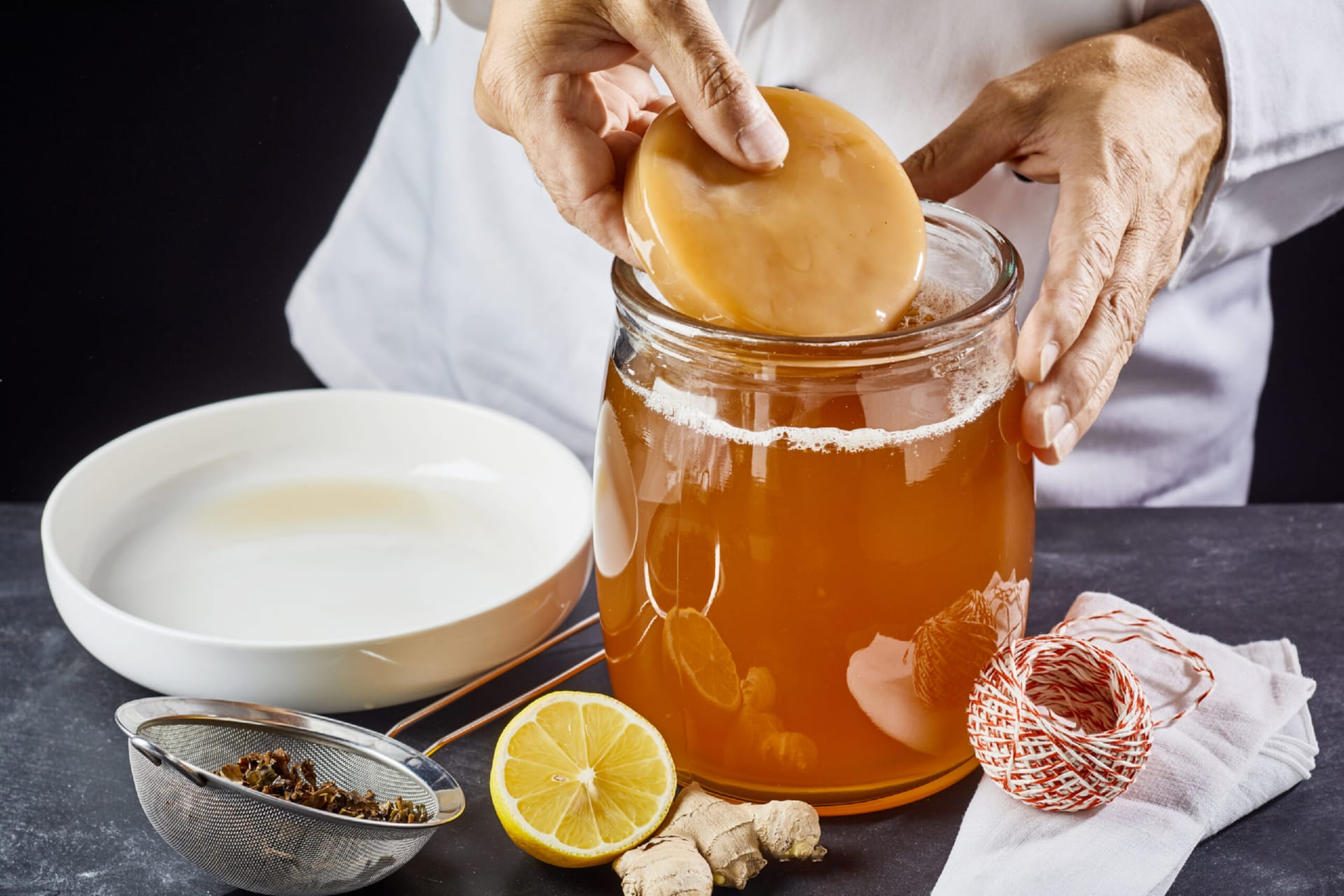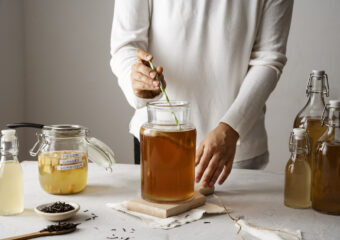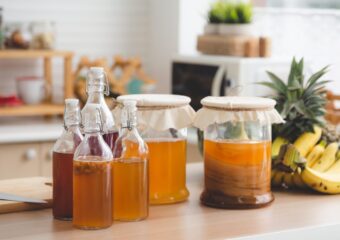How To Make a Kombucha Scoby
Making your own SCOBY at home is a rewarding and simple process that can lead to delicious homemade kombucha. SCOBY, which stands for “symbiotic culture of bacteria and yeast,” is a key ingredient in kombucha fermentation. This gelatinous disc is what ferments the sweet tea mixture, turning it into a tangy and effervescent drink. By following this step-by-step guide, you can create your own SCOBY from scratch and begin your journey into the wonderful world of homemade kombucha.
To begin making your homemade SCOBY, you’ll need a few basics tools and ingredients. This includes black tea bags, water, sugar, and a bottle of unflavored, unpasteurized kombucha. Make sure all your equipment is clean and sanitized to avoid any unwanted bacteria. You’ll also need a glass jar to mix your ingredients in; a rubber band and a woven cloth to cover the jar; and a dark, warm place to store your SCOBY.
Start by boiling 4 cups of water and pouring it into a clean glass jar. Add 4 tea bags and let them steep for about 10-15 minutes. Remove the tea bags and stir in 1 cup of sugar until dissolved. Let the sweet tea mixture cool to room temperature before stirring in the unflavored kombucha. Cover the jar with the woven cloth and secure it with the rubber band. Place the jar in a warm, dark spot and let it sit for 1-4 weeks. Check on your SCOBY periodically to gauge its progress.
Learn about SCOBY culture
If you’re new to the world of fermentation, you may not be familiar with the term “SCOBY”. SCOBY stands for Symbiotic Culture Of Bacteria and Yeast. This culture is an essential component in the process of making kombucha, a beloved fermented tea drink. SCOBY is a gelatinous, rubbery disk that floats on top of the sweetened tea during the fermentation process and is responsible for transforming the tea into kombucha.
SCOBY contains a complex ecosystem of bacteria and yeast that work together to ferment the sweet tea, converting the sugars into beneficial acids and creating a fizzy, tangy beverage. This living culture is what gives kombucha its signature flavor and health benefits. The bacteria and yeast in SCOBY form a symbiotic relationship, with each playing a specific role in the fermentation process.
Creating and caring for a SCOBY culture is a rewarding and educational experience. As you dive into the world of fermentation, you’ll learn about the fascinating chemistry behind the process and gain a deeper understanding of how living organisms can transform simple ingredients like tea and sugar into a complex and delicious beverage.
SCOBY culture is easy to grow at home with just a few simple ingredients and some patience. With the right equipment and a little know-how, you can start your own SCOBY culture and begin brewing your own kombucha in no time. Just remember to follow proper fermentation techniques and hygiene practices to ensure a healthy and thriving culture.
Benefits of Homemade SCOBY
Homemade SCOBY offers a myriad of benefits that you won’t find with store-bought options. The main advantage is knowing exactly what goes into creating your SCOBY. You have control over the quality of ingredients, ensuring it is free from any additives or unwanted chemicals. This also allows you to select the type of tea and sugar you prefer, giving you the flexibility to tailor the flavor to your liking.
Another benefit of homemade SCOBY is the cost savings it provides. While store-bought SCOBY can be pricey, making your own at home is a more budget-friendly option. It only requires a few ingredients that are usually already somewhere in your kitchen, such as tea bags, sugar, and water.
Furthermore, creating your own SCOBY gives you a sense of satisfaction and accomplishment. Watching the transformation of tea, sugar, and a few other ingredients into a living culture is a fascinating process that allows you to witness the magic of fermentation.
Homemade SCOBY also promotes sustainability. By making your own, you are reducing waste associated with store-bought options, such as plastic packaging and transportation emissions. You can feel good knowing you are taking steps towards a more environmentally friendly lifestyle.
Overall, the benefits of homemade SCOBY go beyond just the financial aspect. It provides a sense of empowerment, creativity, and connection to the fermentation process that store-bought options simply cannot offer.
Discover the Advantages of Making Homemade SCOBY
Making homemade SCOBY offers a number of benefits that you can’t get from store-bought versions. One of the most significant advantages is that it can be faster and more cost-effective to create your own SCOBY at home. Plus, when you make your SCOBY, you can be sure of the ingredients used and the process followed. This can be especially important if you’re looking to incorporate healthier options into your diet.
Additionally, a homemade SCOBY allows you to gauge the size and weight of the culture. You can also control the liquid and sweeteners used in the process, such as honey or sugar, and ensure that the mixture is to your liking. This gives you the flexibility to experiment with different recipes and create a SCOBY that matches your preferences.
Another advantage of making your own SCOBY is that you can keep a closer eye on its progress. When you observe the development of your SCOBY over the weeks, you can note any changes in its formation, thickness, or texture. This can help you better understand the culture and make adjustments as needed to ensure its health and activity.
Homemade SCOBYs also tend to contain a larger number of healthy bacteria and yeasts compared to store-bought versions. With the right environment, your homemade SCOBY can thrive and produce a high-quality kombucha brew. This can result in a more delicious and probiotic-rich beverage that you’ll enjoy drinking.
Ultimately, making your own SCOBY can be an easy and rewarding process that allows you to create a culture that meets your needs and preferences. By following the steps closely and being patient, you can earn the bliss of crafting a homemade SCOBY that makes your kombucha brewing experience even more enjoyable.
Step-by-Step Guide for Making SCOBY
To make your own SCOBY at home, you will need the following ingredients and equipment:
Ingredients:
| – Black tea bags (your favorite brand) | – White sugar | – Distilled white vinegar | – Filtered or spring water |
Equipment:
| – Large glass container | – A clean cloth or paper towel to cover the container | – Rubber band to secure the cover | – A straw or wooden spoon |
1. Begin by brewing 1 cup of tea – black, green, or a combination – and sweeten it with sugar or a sweetener of your choice. Let the tea cool to room temperature.
2. In a glass jar, pour the sweetened tea and add the SCOBY. Cover the jar with the cloth or coffee filter and secure it with a rubber band. This will allow airflow while keeping out contaminants.
The Fermentation Process:
4. Place the jar in a warm, dark place – a cupboard or pantry is ideal. Ideally, the temperature should be around 75-85°F (24-29°C).
5. Check on your SCOBY every few days to gauge its progress. You’ll start to see signs of fermentation as bubbles form and a thin layer begins to form on the surface.
6. The fermentation process typically takes 1-3 weeks, depending on the temperature. Warmer temperatures speed up the process, while colder temperatures slow it down.
Maintaining Your SCOBY:
8. Remember to feed your SCOBY with a fresh batch of sweetened tea every 1-2 weeks to keep it happy and thriving. The liquid should taste slightly tangy and no longer sweet.
9. Occasionally flip your SCOBY over to ensure even growth and prevent mold from developing. If you see any mold, discard the SCOBY immediately.
10. The final product will be a thick, rubbery disk that lays on top of the liquid. It’s now ready to use in kombucha-making! Be sure to follow proper storage guidelines if you’re not using it right away.
By following this process, you can earn the bliss of making your own delicious SCOBY at home, free from store-bought versions with unknown origins. Share this recipe with your friends and family to spread the SCOBY love!






